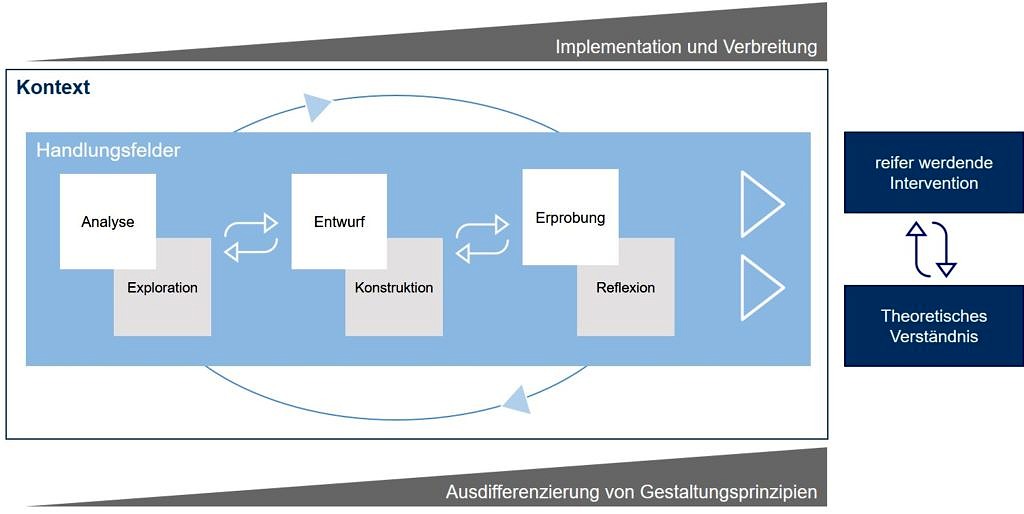Research Approach: Design-Based Research
To comprehensively address the different problem situations and acquire a theoretical understanding of teaching and learning in the specific context, we develop, evaluate, and conduct research based on principles of development research, also known as Design-Based Research.
Development research aims to make an exemplary contribution to solving an educational problem and thereby generate “useful” theories that are context-bound but relevant for broader practice. Questions such as “What works where, when, for whom, and why?” are at the center of interest.
Important principles of this type of research include criteria such as novelty, usefulness, sustainable innovation, cyclical improvement, intervention in unfiltered practice, (interdisciplinary) collaboration, and the dissolution of traditional roles within research (see Jahn & Kenner, 2018). The core principles of development research, according to Fishman et al. (2013), are:
- A focus on relevant practical problems, taking into account the multiple perspectives of the actors involved.
- A commitment to collaborative and iterative development of an educational design or intervention.
- Deliberate engagement in generating theories and knowledge related to teaching and learning and the implementation of the intervention through systematic research.
- Targeted exploration of how capacities can be created to continuously and sustainably transform practice.
These aspects are central to us as an institution when developing and testing target group-specific, subject-specific, or faculty-specific offers.
The following figure illustrates relevant steps in the development, testing, and evaluation of measures:

- The development research process begins with an in-depth analysis and definition of the practical problem and the specific context from various perspectives. At the same time, the state of research on the topic is reviewed and processed. By examining current publications, we obtain important impulses for innovative educational designs and development principles (see, for example, the book reviews in the Infothek Lehre).
- The development of the intervention is adapted to the target context. There is a constant recourse to the results of the context analysis. The draft solution is played through mentally, at the same time reflections on the course of the process take place.
- The intervention is then tested, evaluated and reflected upon several times. In each iteration, the procedure is refined on the basis of the new findings.
- The process ends when a satisfactory solution to the initial problem has been found and a differentiated, theoretical understanding has been gained in the process. The repeated testing of the intervention is accompanied by the differentiation of the design principles and the theoretical understanding.
In testing and reflecting the interventions, we emphasize a high degree of methodological openness to enable triangulation. All methods from the toolbox of empirical social research can be utilized. In this process, theoretical or design key factors that are crucial to the success or failure of the intervention are identified. The process concludes when a satisfactory solution to the initial problem is found, and a nuanced theoretical understanding is gained.
In designing and in testing, we work closely and at eye level with the relevant partners, e.g. in subject-specific or faculty-specific offers. Another example of the use of DBR in our practice is the Scholarship of Teaching and Learning.
Fishman, B. J., Penuel, W. R., Allen, A.-R., Cheng, B. H., & National Society for the Study of Education. (2013). Design-Based Implementation Research: Theories, Methods, and Exemplars.
Jahn, D. (2014). Durch das praktische Gestalten von didaktischen Designs nützliche Erkenntnisse gewinnen: Eine Einführung in die Gestaltungsforschung. Wirtschaft und Erziehung, 66, 3–15.
Jahn, D. (2017). Entwicklungsforschung aus einer handlungstheoretischen Perspektive: Was Design Based Research von Hannah Arendt lernen könnte. EDeR – Educational Design Research, 1(2), 1–17. [PDF]
Jahn, D., & Kenner, A. (2018). Hochschuldidaktische Entwicklungsforschung in Serviceeinrichtungen. In B. Berendt, A. Fleischmann, N. Schaper, B. Szczyrba, M. Wiemer, & J. Wildt (Hrsg.), Neues Handbuch Hochschullehre (Bd. 85, S. 1–22). DUZ Medienhaus.
McKenney, S. E., & Reeves, T. C. (2012). Conducting educational design research. Routledge.
Reinmann, G. (2014). Welchen Stellenwert hat die Entwicklung im Kontext von Design Research? Wie wird Entwicklung zu einem wissenschaftlichen Akt? In D. Euler & P. F. E. Sloane (Hrsg.), Design-Based Research. Franz Steiner Verlag.
You can find blog posts from the DBR Network and other information about the network here.
